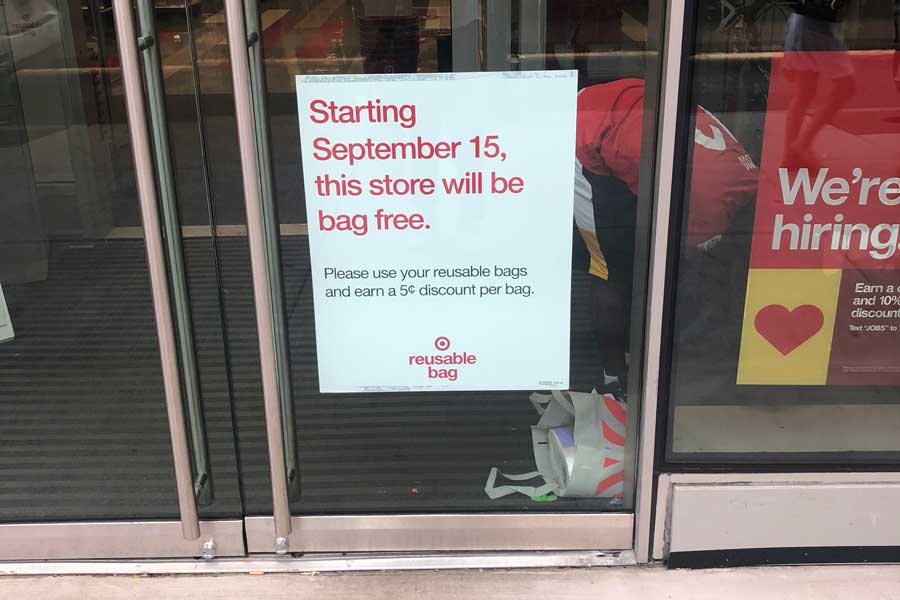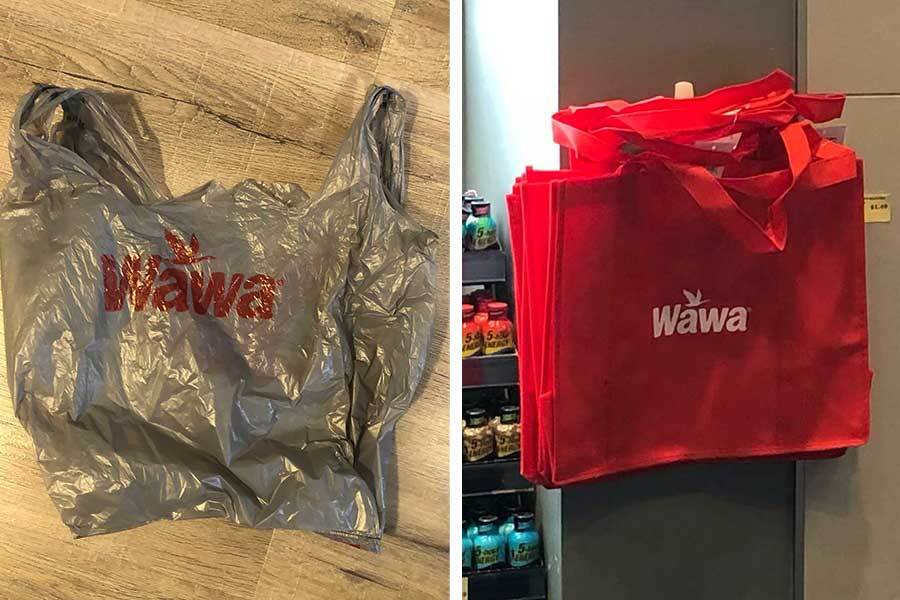Everything You Need to Know About Philly’s Plastic-Bag Ban
Get ready for your soon-to-be-plastic-bagless future.

Target prepares for Philadelphia’s forthcoming plastic-bag ban. Staff photo.
With everything going on in the world, you could be forgiven for not closely following the rollout of Philadelphia’s plastic-bag ban. Hell, it isn’t even the most important trash-related story right now. That honor would go to the Streets Department’s failure to pick up the trash on time. Or possibly the Streets Department ticketing people for having their bins out on the curb past trash day, after having failed to empty said bins on trash day. Or just maybe it’s the expansion of street sweeping.
But plastic bags are a big deal! According to the city, we collectively go through more than a billion single-use bags each year, the majority of them plastic. They often seem to end up in the curbside recycling — wishful thinking, ignorance, or possibly deep-seated guilt on the would-be recyclers’ part — which clogs the fancy machinery at the recycling plant. (Or at least, that’s what happens when Philly is actively recycling — which isn’t always a given.) And this is to say nothing of the environmental impact of bags that simply end up littered.
Good thing Philly’s billion-bag count should be on the decline soon thanks to the new ban. But when, exactly?
Great question. Here’s everything you need to know about the plastic-bag ban.
When Was This Law Passed?
It took about as long as it takes for a plastic bag to degrade for Philadelphia’s plastic-bag-ban bill to be passed. The first failed effort came in 2007. Two years later, Council nearly passed a bill that would have forced businesses to charge for any bags, plastic or otherwise. (At the time, then-City Councilmember Jim Kenney supported the bill, saying the city’s plastic-bag policy needed to “catch up with the rest of the world.”) But ultimately, that bill died after lobbying groups tanked the legislation. Mark Squilla tried again a few years later, also without success.
So you can see why environmental advocates were pleased when a bill — one that didn’t charge a fee, but rather banned all single-use plastic bags — finally passed in late 2019. Of course, you know what happened next. With many businesses not open at all due to the pandemic and others struggling to stay afloat, the Kenney administration pushed implementation of the law back until January 1, 2021, and then once more until July 1st.
So Is The Ban in Effect Now? Why Do I Still See Plastic Bags Everywhere?
You still see bags everywhere because the ban actually isn’t in effect. A very slow rollout is under way, to give retailers plenty of time to exhaust their existing bag supplies while also providing a period of education for businesses and consumers alike.
Here’s the current timeline: As of August, businesses will be required to display signage mentioning the upcoming ban. As of October, the ban will technically be in effect. But it won’t truly be enforced until April 2022. Fines for noncompliance start at $75, and eventually, the city will be able to take businesses to court and seek higher penalties if they refuse to get in line. April 2022 sounds like a long way off, but at least we’re starting the process with signage now. Baby steps!
What’s Actually Banned?
Everyone calls this bill the plastic-bag ban, but that’s something of a misnomer. Certain plastic bags actually are allowed, while certain paper bags aren’t.
Let’s review: Paper bags are safe so long as they’re not made from old-growth trees and use at least 40 percent recycled materials. The bags must also state that they themselves are recyclable.
Nylon, polyester, cloth and other fabric bags are also perfectly acceptable. All single-use plastic bags are banned. But if a plastic bag is more than two and a half millimeters thick and specifically designed for multiple use, it’s allowed.
And don’t worry about your dry cleaning or trash: Plastic bags are still okay for those as well as for packaging certain food products, like meat or fish.
How Effective Are Plastic-Bag Bans, Anyway?
By now, eight states and many more cities have passed plastic bag bans, which means it’s possible to grade how the policy has performed elsewhere. An NPR article from two years ago noted that California cities in which plastic bags had been eliminated had a predictable decrease in plastic-bag waste. But at the same time, consumption of plastic garbage bags (primarily of the smaller four-gallon variety), which are made of even more environmentally unfriendly thick plastic, soared. Paper-bag consumption also rose, and while those bags are much more easily recycled, the trade-off is that it takes much more energy and more greenhouse gases to produce those paper bags.
That’s part of the reason environmental advocates prefer policies that include a fee for all single-use bags, to provide yet another push toward reusable bags. Philly’s law has no fee component, and it remains to be seen how many businesses will end up simply replacing plastic with paper.
Sure sounds like a mixed bag.
What’s This About the State Legislature Banning Bag Bans?
A quick history lesson: Back in 2017, Republicans in Harrisburg passed a bill that would have prohibited bag bans at the local level. Governor Tom Wolf vetoed that bill. But since we’re talking Republicans in Harrisburg, that didn’t stop them. Two years later, they slid a ban on bags into budget legislation that ended up being signed.
The City of Philadelphia sued the state over the attempted ban on bans. Fortunately for bag-banners in Philly, that budget law has now expired, and this year’s budget contains no such prohibition. So it seems we’re in the clear. At least for now.
Have Any Businesses Actually Changed the Way They Operate Yet?
What we really wanted to know is this: What is Wawa — home to the city’s most ubiquitous and famous branded plastic bag — doing about all of this?
A spokesperson told us, “We’re offering customers a low-cost 25-cent reusable bag that they can use both at Wawa and for other shopping or personal needs, while encouraging skipping the plastic bag altogether whenever possible.”
A 25-cent reusable Wawa-branded bag? That sure sounded exciting, so I took a trip down to Wawa’s flagship store at 6th and Chestnut. There were some reusable tote bags hanging behind the cash registers. Score! When I asked for one, though, I learned they cost a buck-fifty. The cashier had no idea what I was talking about when I asked for one of the new 25-cent bags. But I did get a hot tip: Apparently Target was offering reusable totes — for free!

On left: Wawa single-use bag. On right: Wawa reusable bag.
So I marched up Chestnut Street — Wawa single-use plastic bag in hand — and headed for Target. A different Wawa plastic bag blew by on the street. On my pilgrimage, I couldn’t find a single store with signs mentioning the upcoming bag ban.
I finally made it to Target, past a sign proclaiming, “This store is now bag free.” An auspicious sign!
When I got to the checkout line, though, there were no reusable totes to be found. Apparently, they had run out. There was, however, a replacement: a gigantic pile of plastic bags.


